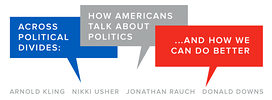Lead Essay
Arnold Kling has devoted years to observing and participating in American political discourse. Such as it is. He writes that all too often, Americans seek to demonize those with whom they disagree, rather than trying first to understand what they are saying in their own terms. Social media does not help us to do better, he argues, but one thing that could is surprisingly simple: “If you think that the problem with political discourse is caused entirely by the other side,” he writes, “then look in the mirror instead.”
Response Essays
Jonathan Rauch offers a “friendly amendment” to Arnold Kling’s argument: We must amend our weakening civic institutions. He recommends direct social action, including but not limited to various organizations that seek to start conversation across political divides; strengthening institutions that don’t line up neatly with partisan politics, but that serve good purposes anyway; and—perhaps controversially—re-engineering our social media environment.
Nikki Usher turns her attention to American journalism, which often sets the tone for our political conversations. She finds that with the decline of local journalism, journalists have an increasingly cohesive and uniform view—one that sees itself as cosmopolitan, but that is really parochial to Washington, DC. Journalists nowadays often stumble in covering other areas of the country, which increases the importance of Arnold Kling’s populist/cosmopolitan divide.
Donald Downs considers that free speech requires a concern for the personhood and well-being of others—and the concern to avoid offense can also be stifling. He characterizes this as a tension between chutzpah and “due doubt” of one’s own beliefs, and he argues for the importance of civility understood in a special way: Civility is not mere politeness in politics, he argues; it is a key part of the role that we must all play as citizens, regardless of political disagreements.
Coming Up
Comments and discussion through the end of the month.

